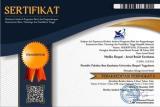PROMOSI KESEHATAN DI KALANGAN REMAJA MELALUI MEDIA: LITERATUR REVIEW
DOI:
https://doi.org/10.35842/mr.v15i2.243Keywords:
Health Promotion, Media, TeenagersAbstract
Background: the development of the media today is very influential in adolescent behavior in daily life. Teenagers use the media to search for information they don't know about. Media with the internet is a media that is very easily accessible and valuable for adolescents to access various health issues. Some scientific discussions see the potential of the media as a tool to promote positive health behaviors in adolescents.
Objective to identify the potential of the media as a tool to promote positive health behaviors in adolescents. Â
Methods: The methodology used is the literature literature in which we examine research that is relevant to the use of media as health promotion among adolescents. Literature is obtained from journal link searches such as pubmed, google schoolar. Publication articles used as literature have inclusion criteria such as the media used are new media both print and electronic.
Results: An article search returned 20 articles. After submitting 20 articles, 10 articles met the inclusion criteria. health promotion interventions using media literacy can have a positive impact on adolescent behavior. Health promotion to increase the positive behavior of adolescents can be through social networks such as Facebook, Twitter, blogs, microblogs, discussion forums.
Conclusion: use of Media Literation Education (MLE) as an alternative to comprehensive sexual health education. Through MLE it is easier to introduce topics about relationships and sexual health than traditional sexual health education programs.
References
BKKBN, 2008. Panduan Pengelolaan Pusat Informasi dan Konseling Kesehaan Reproduksi Remaja. Jakarta: Direktorat Remaja dan Perlindungan Hak-Hak Reproduksi BKKBN
Diclemente, R.J., Santelli, J.S. & Crosby, R.A., 2009. Adolescent Health : Understanding and Preventing Risk Behaviors first edit., USA: Jossey Bass
Ediastuti, E. dan Manikam, I.H., 2010. Determinan Remaja Melakukan Hubungan Seks Pranikah. Dalam Keluarga Berencana dan Kesehatan Reproduksi. Diedit oleh Tukiran, A.J. Pitoyo, Pande Made Kutanegara. Yogyakarta: Pustaka Pelajar dan Pusat Studi Kependudukan dan Kebijakan
Evers, C.W., Albury, K., Byron, P., Crawford, K. 2013. Young People, Social Media, Social Network Sites and Sexual Health Communication in Australia: “This is Funny, You Should Watch Itâ€. International Journal of Communication. 7: 263–280
Gabarron, E and Wynn, R. 2016. Use of social media for sexual health promotion: a scoping review. Global Health Action. 9:32
Hieftje, K., Edelman, E.J., Camenga, D.R., Fiellin, L.E. 2013. Electronic Media-Based Health Interventions for Behavior Change in Youth: A Systematic Review. JAMA Pediatr. 167(6): 574–580
Jones, K., Eathington, P., Baldwin, K., & Sipsma, H. 2014. The Impact of Health Education Transmitted Via Social Media or Text Messaging on Adolescent and Young Adult Risky Sexual Behavior. Sexually Transmitted Diseases, 41(7), pp.413–419
Levin-Zamir, D and Bertschi, I. 2018. Media Health Literacy, eHealth Literacy, and the Role of the Social Environment in Context. Int. J. Environ. Res. Public Health. 15: 1643
Lopes, F.; Araújo, R. 2018. Power to health reporters: Health literacy as a tool to avoid pressures from news sources. Port. J. Public Health. 35: 193–201
Maf’ula, A., Hastuti,U.S., Rohman, F. 2017. Pengembangan Media Flipbook Pada Materi Daya Antibakteri Tanaman Berkhasiat Obat. Jurnal Pendidikan: Teori, Penelitian, dan Pengembangan. 2 (11): 1450—1455
Parvanta, C. Nelson, D.E., Parvanta, S.A., Harner, R.N. 2011. Essentials of Public Health Communication R. Riegelman, ed., USA: Jones & Bartlett Learning
Portnoy, D. B., Lori, A. J., Sheldon, S., Johnson, B. T., & Carey, M. P. 2008. Computer-delivered interventions for health promotion and behavioral risk reduction: A meta-analysis of 75 randomized controlled trials, 1988–2007. Preventive Medicine. 47: 3-16
Rehusisma, L.A., Indriwati, S.E., Suarsini. E. 2017. Pengembangan Media Pembelajaran Booklet dan Video Sebagai Penguatan Karakter Hidup Bersih Dan Sehat. Jurnal Pendidikan: Teori, Penelitian, dan Pengembangan. 2(9): 238—1243
Scull, T.M., Malik, C.V., Kupersmidt, J.V. 2014. A Media Literacy Education Approach to Teaching Adolescents Comprehensive Sexual Health Education. Media Lit Educ. 6(1): 1–14.
Stevens, R., Gilliard-Matthews, S., Dunaev, J., Todhunter-Reid, A., Brawner, B., Stewart, J. 2017. Social Media Use and Sexual Risk Reduction Behavior among Minority Youth: Seeking Safe Sex Information. Nurs Res. 66(5): 368–377
Veale, H.J., Sacks-Davis, R., Weaver, E.R.N., Pedrana, A.E., Stoové, M.A., Hellard, M.E. 2015. The use of social networking platforms for sexual health promotion: identifying key strategies for successful user engagement. BMC Public Health. 15 (85): 2-11
Walther, B., Hanewinkel, R., Morgenstern, M. 2014. Effects of a Brief School-Based Media Literacy Intervention on Digital Media Use in Adolescents: Cluster Randomized Controlled Trial. Cyberpsychology, Behavior, and Social Networking. 7(9): 616-623
Welch, V., Petkovic, J., Pardo, J.P., Rader, T., Tugwell, P.2016. Interactive social media interventions to promote health equity: an overview of reviews. Research, Policy and Practice. 36(4):63-75




